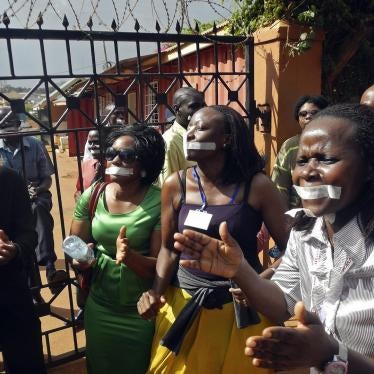Uganda’s Electoral Commission should uphold the presumption of innocence and objectively consider whether to permit the indicted opposition leader Dr. Kizza Besigye to run for president, Human Rights Watch said today. Nominations for the 2006 presidential candidates are scheduled to take place on December 14 and 15.
Leader of the Forum for Democratic Change, Besigye is the main opposition candidate in the presidential elections scheduled for March. He challenges twenty-year incumbent President Yoweri Museveni, who is running for his third term in office. On November 15, 2005, Besigye was charged with treason and rape before the High Court. On November 24, 2005, Besigye was charged with terrorism and illegal possession of firearms before the General Court Martial. On December 12, all proceedings in the cases were temporarily stayed.
Although the High Court granted bail to Besigye on November 25, he remains in Luzira prison near Kampala because of the court martial charges. Human Rights Watch is concerned that the charges against Dr. Besigye may be a politically motivated attempt to prevent him from running for president.
“The presumption of innocence should prevail. Besigye has not been found guilty of anything,” said Jemera Rone, Uganda researcher at Human Rights Watch. “He is still in pretrial detention because of jurisdictional questions regarding the military court and the civilian court. This is not a legal or constitutional basis on which to deny anyone the right to be nominated as a political candidate.”
The independent Electoral Commission must determine whether Dr. Besigye, who has been charged but not tried or convicted, may run for political office. According to press reports, the Electoral Commission previously stated that Besigye could be nominated even if he was in detention. The Minister of State for Constitutional and Justice Affairs has reached the same conclusion.
Human Rights Watch is concerned that the Electoral Commission will be intimidated or unduly influenced by a December 7 letter from Attorney General Dr. Khiddu Makabuya. In it, the Attorney General, responding to a question from the Electoral Commission, urged it to stop Besigye’s nomination, arguing that Besigye is the subject of serious criminal proceedings and that his nomination would be “tainted with illegalities.” The Attorney General is part of the ruling party.
Human Rights Watch believes that the Attorney General erred because he did not give precedence to Uganda’s obligations under the International Covenant on Civil and Political Rights, to which it is party. The Covenant provides for the right to be presumed innocent, and treated as innocent, unless and until conviction by a court meeting international fair trial standards. The right to be presumed innocent applies not only to the evaluation of evidence in court, but also to treatment before trial. The Covenant also provides that every citizen shall have the right and opportunity to take part in the conduct of public affairs and to be elected in genuine periodic elections.
“Free elections anywhere require an impartial electoral commission independent of the ruling party and the government of the day,” said Rone. “How Uganda’s Electoral Commission handles the Besigye case will set the tone for the fairness of the March presidential elections. It is important that the Electoral Commission adhere to international human rights—and remain independent of the political parties, including the ruling party.”





